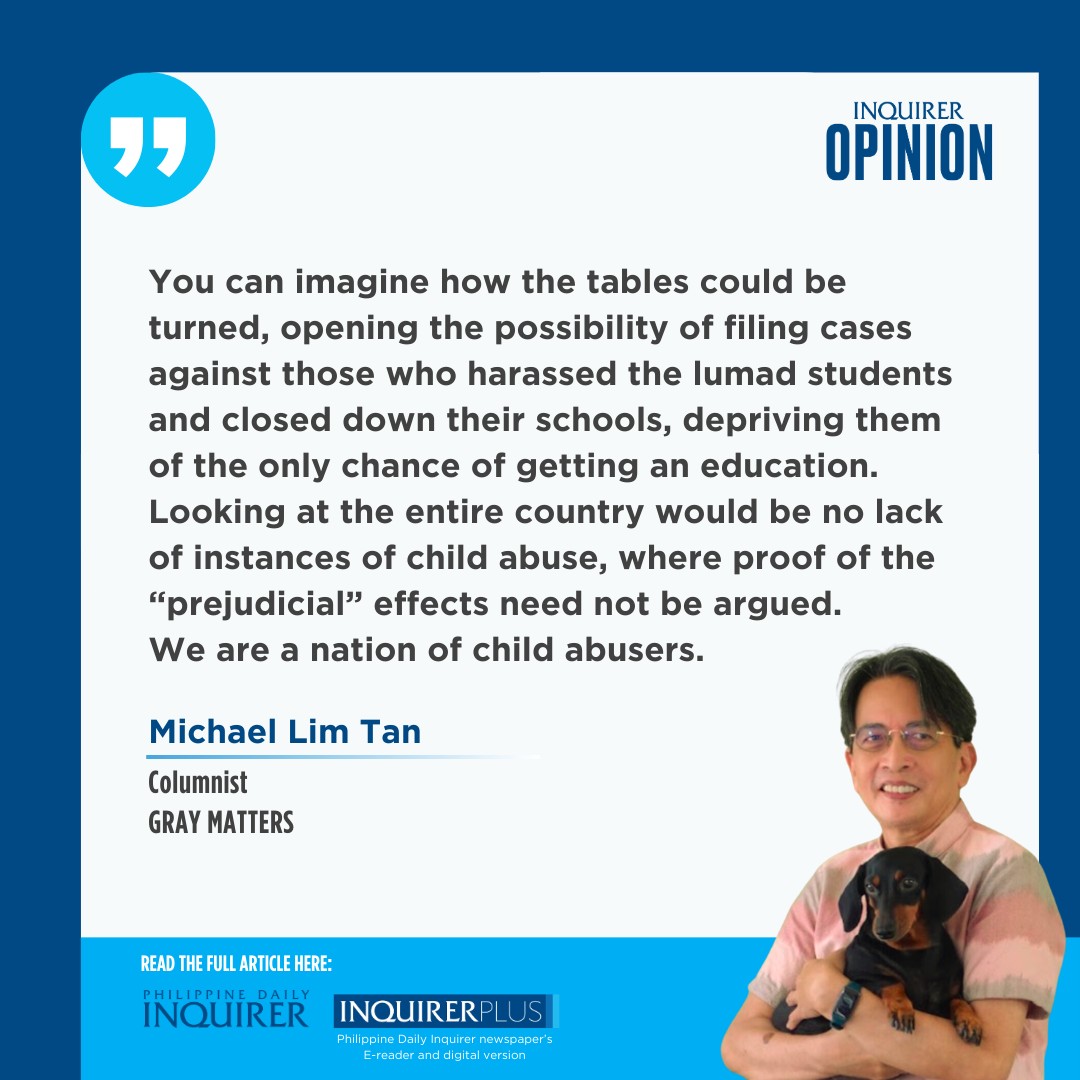Deciphering ‘child abuse’
A recent decision by a Regional Trial Court (RTC) in Tagum, Davao del Norte, convicting 14 Filipino of “child abuse” could end up a case study in the Philippines and maybe even internationally on legal doublespeak and the travesty of justice.
It took me several hours to wade through the court decision, promulgated last July 3, almost six years after the arrests of teachers now known as the Talaingod 18, Talaingod being a town in Davao del Norte where the alleged child abuse occurred.
It’s a complicated story, set against a long history of maltreatment of the “lumad” or indigenous peoples of Mindanao who have, through much of the 20th century, been harassed and pushed away by the military from their ancestral lands, lands rich in natural resources and coveted by companies engaged in mining, logging, and agribusiness.
No one cared, except for social action groups, many affiliated with the Catholic and Protestant churches who, over the last 40 years or so, began to put up lumad schools, mostly elementary and high schools. These schools offered lumad youth formal education, taught with respect for their traditions and culture.
The schools gained national attention in the 2010s as the government became more aggressive against the lumad organizations that had emerged. Villages were militarized and their lumad residents forced into relocation centers, far from their ancestral homes.
The lumad schools were also targeted for harassment, their teachers accused of propagating communism. Some of the larger schools resisted and continued with classes. “Bakwit” (after the English word evacuees) schools were put up in the relocation centers so children could continue studying.
But the harassment intensified, emboldened by former president Rodrigo Duterte’s imposition of martial law in Mindanao in May 2017 and two months later, an open threat to bomb lumad schools. Most of the lumad schools were closed down in the years that followed. The Department of Education did put up their alternative lumad schools but these are no longer operating either.
The Talaingod 18 story unfolded in November 2018 where, following several months of military operations to cut off access to schools in the Talaingod area, a national solidarity mission led by writer Satur Ocampo, ACT Teachers party list Rep. France Castro, lawyer and educator Ma. Eugenia Victoria Nolasco, and others set out to bring relief and investigate what was going on.
The military, apparently aware of the mission, ordered lumad schools in Talaingod to immediately evacuate all their students. The teachers initially resisted but on the night of Nov. 28, finally left the schools, heading out on a three-hour hike to meet the national solidarity mission. During their hike, large rocks were thrown at them and their vehicle had to navigate metal spikes. Live ammunition fire was also reported. The beleaguered teachers and students met up with the solidarity mission but the military stopped them at a checkpoint and hauled them off to the municipal police station where they were charged with kidnapping (a charge later dismissed) and child abuse. The students were detained for three days by the Department of Social Work and Development, released only after a court ordered them to release the children.
The court case languished until July 3, when the Tagum RTC promulgated its decision finding 13 of the defendants guilty of child abuse, as defined in Republic Act No. 7610.
Court convictions depend on proof of a violation of the law or laws, in this case, it should show that what transpired—the transport, described as happening at night with all kinds of risks including the military and the New People’s Army—caused harm to the minors.
Instead, the court ruled that “the prosecution need not prove that the acts of child abuse, child cruelty, and child exploitation have resulted in the prejudice of the child because an act prejudicial to the child is different from the former acts.” Read that again, and again, as I did, several times, and see if you can decipher the passage.
Moreover, the court decided that “the fourth act is so broad enough to penalize those acts which are not covered by the three above-mentioned acts provide that it would clearly affect the growth and well-being of a minor.”
The court, in effect, puts the entire judicial time at risk with such a broad, albeit murky, definition. You can imagine how the tables could be turned, opening the possibility of filing cases against those who harassed the lumad students and closed down their schools, depriving them of the only chance of getting an education.
Looking at the entire country would be no lack of instances of child abuse, where proof of the “prejudicial” effects need not be argued. We are a nation of child abusers.
—————–
mtan@inquirer.com.ph





















